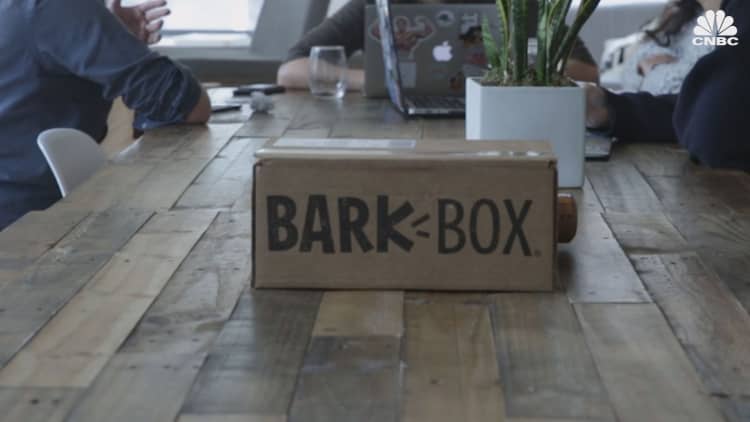
Across the retail industry, people are largely unsubscribing to subscription services, leaving companies like Blue Apron and BirchBox struggling. But at least one company is enjoying growing success via subscription model.
Bark sends a monthly delivery of dog toys, treats and chews in its BarkBox, which are delivered to customers monthly.
BarkBox subscriptions start at $21 each, and the deliveries are themed and unique every month. Consumers are encouraged to give BARK feedback regarding their boxes, so that the company can create a more personalized product month-over-month.
Founded by Matt Meeker, Henrik Werdelin and Carly Strife in 2012, BARK has shipped more than 70 million products to its customers.
The company has 500,000 subscribers and a 95 percent retention rate, making it a contender in the nearly $70 billion pet products industry, which is still growing. Retail pet food alone grew more than three times as fast as packaged foods in the U.S., according to the research firm Euromonitor.
Bark is also moving to sell more than just subscription boxes. It partnered with Target in December, and is looking for more options in the coming year.
While executives noted in December that they are considering an IPO for Bark, they haven't set a public timeline, at least not yet. Instead, Meeker said, Bark is focused on preparation.
"The progress we make is just getting the business in shape for it…we're three months closer to it than we were." Executives have also hinted that an acquisition may happen in the future.
But not all subscription services are mirroring Bark success.
The rise of subscription services started with the trailblazing BirchBox in 2010.
It provides subscribers with a monthly array of beauty products, and the business model initially electrified the subscription service industry. By 2014, BirchBox boasted an estimated $125 million in annual revenue and more than 800,000 subscribers.
But by 2016, BirchBox was faltering. Despite raising over $80 million since it launched, BirchBox was unable to secure a new investments, and was forced to lay off a quarter of its staff.
Other subscription companies, like meal kit delivery services, have seen significant declines in customer retention.
In fact, a Cardlytics study of 45,000 consumers who signed up for meal kit services in January 2016, showed that nearly three quarters of subscribers cancelled their subscription within 6 months.
Blue Apron has been fighting to stay above water since it went public nine months ago, dropping 80 percent since June. Despite having annual revenue of $881 million, Blue Apron's 2017 free cash flow was a loss of $277 million.
For now, Bark has found a sweet spot of loyalty and a growing market, making it a company to watch closely.

